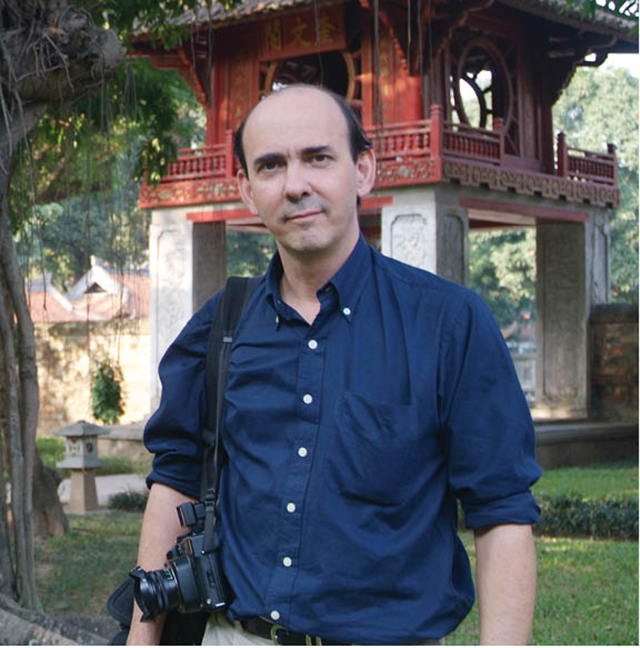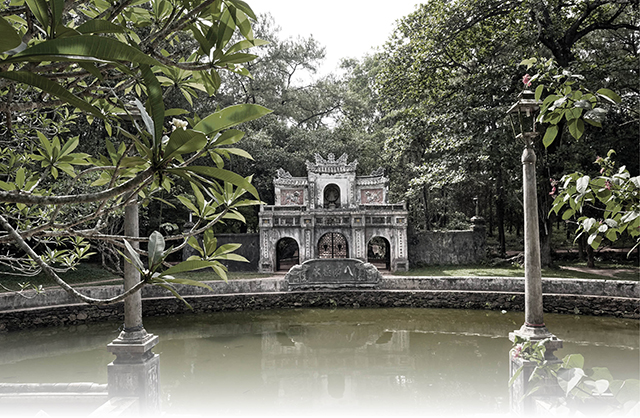
The photographer Nicolas Cornet. Photo: N.C
Before taking photos, he had stayed in pagodas, had meals with monks and felt he belonged to that quiet place. Hue pagodas in his photos look realistic and modest. They give the viewer a sense of calmness, gentleness and depth.
“My wife is Vietnamese-French. Her family has assisted me a lot in my journey toward an understanding of the Vietnamese culture, especially pagodas in Vietnam. I also have a house in Vietnam and Vietnam is always in my heart,” revealed Nicolas Cornet.
Culture is very diverse. Why pagodas, but not anything else, Sir?
For 30 years now, I has regularly visited Vietnam. From my initial feelings of the cultural and architectural heritage, I gradually became interested in pagodas and their significance to Vietnamese people.
In 2014 I visited famous pagodas in the North while they were under repair. I came to a decision to publish a photo book about big pagodas in Vietnam so that younger generations, those who are of Vietnamese origin, as well as my friends will have a better view at that heritage.
And Hue is one of your important destinations?
During the three years working on the book about pagodas, I visited Hue many times and was very excited with the city. I did not have any difficulties here except for its changeable weather. But I think that change is also part of the impermanence. I often chose a place, sat down and beheld things for a long time. Sometimes I concentrated on the chanting of the monks. Sometimes, I found myself meditating while taking photos of pagodas in Hue.
What really attracted you at the pagodas in Hue?
I like Tu Hieu Pagoda very much for its beauty in harmony with nature. This is very typical of pagodas and other constructions in Hue. I stayed with the monks and took photo of them, including their everyday life, while they were playing football for example.
Another pagoda that I really enjoyed is Bao Quoc. That was the place where I “hunted” lots of beautiful moments. Thien Mu Pagoda with its pastoral beauty facing the gentle Perfume river is an indispensable place. My photos there are great too.

Part of Tu Hieu Pagoda. Photo: Nicolas Cornet
Is there any difference between the pagodas in Hue and the ones in other areas you have visited?
As far as I know, in Vietnam, the oldest pagodas are in the North. Wooden constructions there are very beautiful, evoking warm and close feelings. Beams, doors and windows and other wooden objects are beautifully carved.
Pagodas and other wooden constructions in Hue have one thing in common; that is the harmony with the surrounding landscape including trees and plants, rivers and mountains. Architecture here blends with nature, leading not only me but also any others to another world where we really immerse ourselves in it.
Even when taking photos of places of worship like pagodas, you still focus on everyday life?
I am always interested in everyday life, which can be seen through my four photo books about Vietnam. My most recent book ‘Pagodas in Vietnam’ is not an exception.
We cannot understand a country and its culture if we do not observe and study its everyday life. I often meet and take photos of people. Sometimes I go with them, observe them and live with them.
I feel that I am part of their lives. I always want to take photos of them in their own space, not bring them into the space of the photo.
Many pagodas in Hue are degrading and need repair. As a photographer, what do you think about it?
We need to conserve all this heritage. As a fan of ancient architecture in Vietnam, I think this can be done by preserving ancient constructions and building new ones next to them, like what has been done with Giac Lam Pagoda in Ho Chi Minh City.
Anything you want to say with those who love Hue culture?
In 2019, I will have two exhibitions where I will display my photos and books about pagodas at the Centers of French Culture in Hue and Da Nang. I think pagodas need conserving. Photographers need to take photos of these architectural constructions to keep track of history. Through newspapers, I know that Dieu De Pagoda in Hue is now under repair. I hope it would be conserved properly.
Nicolas Cornet is a French professional journalist and photographer and author of tens of books. He has taken part in many exhibitions in Europe and Asia. In late 2018, at the Center of French Culture in Hanoi, his exhibition took place with a 250-page book introducing architecture and decorative patterns and the beauty of everyday life in pagodas. Since he started his photo journey of pagodas in Vietnam, he has been enjoying vegetarian food. At the pagodas, he often asked for permission to go to the kitchens watching monks cooking and imitating. At home, he cooks vegetarian food for his wife and children to “evaluate”. They all think it is delicious.
“With exhibitions, I want to preserve the beauty of the cultural heritage and hope the Vietnamese as well as those who love the Vietnamese culture will realize that pagodas are part of the national cultural heritage of Vietnam,” said Nicolas Cornet.
By Phan Thanh
